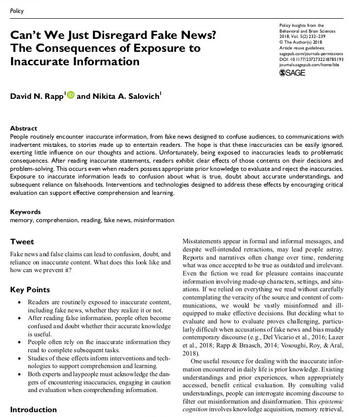
Related contents
A multi-dimensional approach to disinformationThe fake news game: actively inoculating against the risk of misinformation
“News you don’t believe”: Audience perspectives on fake news
Readers are constantly exposed to inaccurate content. Tests have demonstrated that this can create confusion (that can be indicated by an increase in reading time) even when prior knowledge and experience should protect them from considering and using inaccurate information.
This leads people to question the validity of ideas they should be confident are obviously true. People tend to be overconfident about what they know, but reading inaccurate information tends to reduce confidence. Reduced confidence, however, does not necessary lead to a reduction in the use of information.
People show reliance on inaccurate information even after reading fiction, or after conversations with people who they have no particular reason to consider credible (social contagion).
There are various ways in which inaccurate influences can be combated: motivating individuals to engage in strategic evaluation (e.g. by taking notes); compartmentalisation, which allows to encode learning into general knowledge or to keep it separate (e.g. as fiction); source monitoring; and recognising discrepancies.
Tags: Fake news and disinformationThe content of this article can be used according to the terms of Creative Commons: Attribution-NonCommercial 4.0 International (CC BY-NC 4.0) . To do so use the the wording "this article was originally published on the Resource Centre on Media Freedom in Europe" including a direct active link to the original article page.

